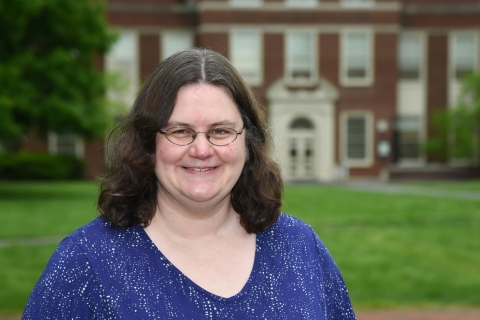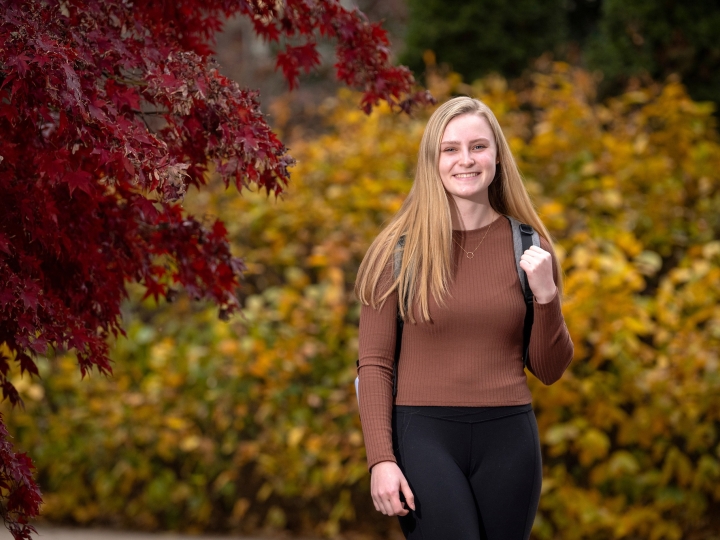Bucknell Librarian Aids Ukrainian Digital Preservation
April 25, 2022

Bucknell University social sciences librarian Carrie Pirmann. Photo by Gordon R. Wenzel
As the Russian assault on Ukraine rages on, Bucknell University social sciences librarian Carrie Pirmann has joined an international effort of some 1,300 archivists who are racing to back up Ukraine's digital archives through the Saving Ukrainian Cultural Heritage Online (SUCHO) project.
Pirmann was recently featured for her efforts in a story by The Washington Post.
She sees preserving the digital archives and digital collections as something the library community should be concerned about and acting upon. If digital materials are hosted in Ukraine or in other places where servers could be destroyed, she says there may be no way to ever get those digital artifacts back.
"Further, if both digital and print copies of materials are destroyed, those pieces of history are gone forever. The same is true for physical objects and buildings; we've come across a surprising number of 3D or online tours of museums and historic sites, which we save as another record of the institution," she says. "We're also concerned about sites hosted outside of Ukraine, because hosting providers could potentially turn off or take down sites for non-payment of hosting fees."
Pirmann has primarily been using her own laptop and working on the project in evenings and on weekends. She estimates putting in between 15 and 20 hours a week, focusing on both archiving websites and locating sites that need to be archived. She's part of the group using an open source program called Browsertrix Crawler, which captures all of the contents of a website and stores it in a file that can be loaded from anywhere with an internet connection.
"In this way, users can view and browse a website even if it's gone offline," Pirmann says. "My other contribution has been to identify websites that need to be archived. This is really where I put my librarian skills to use. I scour lists of sites, do a lot of advanced Google searching, and do a lot of close searching and combing of Google Maps to locate sites. I don't speak or read Ukrainian, so there's a lot of reliance on Google Translate as well."
Pirmann has been working on the project for about seven weeks and as of April 15 estimates that she's archived about 175 sites through Browsertrix, and identified between 600 to 700 sites that needed to be archived. She calls the situation extremely urgent.
"Each day, Ukrainian libraries, museums, archives and other cultural heritage sites are being damaged or at risk of being damaged," she says. "Not only are physical sites at risk, but the websites of so many institutions and organizations are at risk, especially if they are hosted in Ukraine. The SUCHO team is focused broadly on saving anything web-based that we can identify that focuses on some aspect of Ukrainian cultural heritage."
As of April 13, 2022, the SUCHO effort has saved more than 30 terabytes of scanned documents, artworks and many other digital materials from more than 3,500 websites of Ukrainian museums, libraries, archives, theatres, churches, universities, parks, photo collections and music collections, among others. According to Pirmann, if a website is related to Ukrainian history and culture, the SUCHO volunteers will save it. The sites range from the massive, such as the State Archival Service of Ukraine, to small public libraries and village museums.
Pirmann calls the volunteer effort highly coordinated and collaborative.
"My sense is that a lot of the volunteers, such as myself, focus on one or two areas of the project, often those that align with our areas of professional expertise," she says. "Everyone is so generous with their time and expertise, and we are constantly brainstorming ideas and helping each other with questions via a very active Slack channel."
She sees no immediate end to the project since there seems to be no forthcoming end to the conflict, or the digital archives that need to be preserved.

